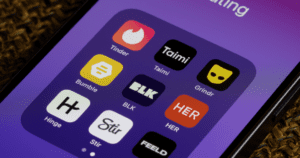The Hidden Danger That Lurks in Every Dating App: 7 Alarming Dangers of Dating & How to Stay Safe
In an age where nearly half of American adults have used dating apps to find potential partners, what was once considered taboo has become a cultural norm. But beneath the polished profiles and witty bios on mobile dating applications, there are hidden threats that can jeopardize your privacy, safety, and even your life.
Recent headlines, academic studies, and real-world stories all point to one undeniable truth: the dangers of dating apps are real, widespread, and growing. Whether you’re using apps like Tinder, Bumble, or Grindr, it’s vital to understand the technology-facilitated risks that lurk just beneath the surface.
This article dives into seven of the most disturbing dangers that can be facilitated through dating apps, and provides actionable prevention strategies to help you stay safe.
1. Criminal Behavior Is On the Rise in Online Dating
Increased access to strangers has created the perfect hunting ground for criminals. From scams and catfishing to sexual assault, robbery, and even murder, countless incidents have been facilitated through dating apps.
According to Australia’s Law Society Journal, there have been a number of reported crimes committed by perpetrators using apps like Grindr to meet victims and commit violent offences. These aren’t isolated incidents—they represent a broader pattern of criminal behaviour exploiting online platforms that lack oversight.
In many cases, technology-facilitated crimes go unreported, especially when victims feel ashamed, embarrassed, or unsupported by law enforcement. This is especially true for gay men and members of the queer community who fear additional stigma or being “outed.”
2. Your Personal Information Is Being Exploited
When you create a profile on a dating app, you’re handing over a surprising amount of personal information—often without realizing it. This can include:
- Your real name
- Age and birthday
- Location or geolocation data
- Photos with identifiable backgrounds (homes, car plates, work uniforms)
- Conversations that contain intimate or sexual encounters
Unfortunately, many dating platforms don’t safeguard this information adequately. Without proper verification, it’s easy for hackers or malicious users to create fake profiles and use stolen information to scam or blackmail others.
Some attackers even build profiles designed to gather intimate information about their targets, which they later exploit through sextortion or identity theft.
3. Vulnerable Populations Are Disproportionately Targeted
Data shows that certain groups are more likely to use dating apps—and they are also more likely to become victims of dating app crimes.
These include:
- College students often lack dating experience and tend to feel safe in a university environment.
- Members of the gay community, particularly young gay men, may use apps like Grindr to explore their sexual orientation discreetly.
- Single parents, especially single mothers, have been targeted by predators looking to gain access to their children.
A study by Childlight revealed that predators have used dating apps not just to meet victims, but to establish long-term connections with them—only to exploit their trust for sexual abuse or access to minors.
4. Technology-Facilitated Sexual Abuse Is a Growing Threat
Unlike traditional forms of abuse, technology-facilitated sexual crimes can take many digital forms:
- Sharing of intimate images without consent
- Coercing someone to send explicit photos
- Luring people under false identities
- Livestreaming sexual harassment or abuse
These threats often lurk in conversations and escalate quickly after users meet in person. In some studies, sexual assaults that originated from online dating were reported to be significantly more violent than other acquaintance crimes.
One particularly disturbing trend is how often these crimes happen after users met online and trusted the platform to be a safe space.
5. Platforms Prioritize Engagement Over User Safety
No Mandatory Verification or ID Checks
Many online platforms still allow users to create profiles with no proof of identity. This loophole allows banned perpetrators to return easily under a new name and photo. Without verification, anyone can impersonate someone else—making deception effortless.
AI Is Underused in Detecting Abuse
Although AI can detect inappropriate behaviour, suspicious language, or grooming tactics, most apps like Tinder, MeetMe, or Badoo have not deployed AI tools robustly. Instead, they rely on user reports, which often come too late.
Reporting Tools Are Weak or Nonexistent
Even when users report abuse, platforms fail to act decisively. There is a critical need for user protection, not just through alerts but with real-time moderation, AI-powered screening, and prevention systems.
6. Predators Use Dating Apps to Groom and Exploit
Dating apps have sadly become a lucrative tool for organized abuse. According to the Childlight Institute, many men convicted of child sexual offences admitted to using dating apps to find single parents and establish trust.
The tactic is as follows:
- Build trust with the parent
- Spend time with their children
- Secretly exploit them through manipulation or physical abuse
Apps that do not vet users properly allow predators to facilitate this kind of behavior with few consequences.
7. Prevention Strategies That Actually Work
Despite the dangers of dating apps, there are ways to safeguard yourself and make smarter choices.
✅ Before Matching
- Use apps that require identity verification
- Be skeptical of profiles with vague bios or only one photo
- Never share personal information early on
✅ While Chatting
- Keep conversations within the app
- Watch for manipulative behaviour like excessive flattery or guilt
- Avoid people who push for in-person meetings too quickly
✅ Meeting In Real Life
- Always meet in public
- Tell a friend where you’re going
- Trust your gut—if anything feels off, leave
Ultimately, a safer environment is only possible when platforms, users, and even legislators work together to create better prevention strategies.
Final Thoughts: Toward a Safer Future in Online Dating
We live in an age where more people than ever use dating apps to connect, but far too few are aware of the dangers that lurk behind the screen.
The dangers of dating apps aren’t just about bad dates. They’re about systemic risks: data misuse, sexual harassment, predators, and unchecked technology-facilitated abuse.
There is a growing movement among safety advocates, legislators, and security experts to implement tighter regulations and enforce standards across all dating platforms. But until that becomes a reality, the responsibility falls on you to prioritize your safety.
So whether you’re using Bumble, Grindr, Tinder, or any other app, stay informed, stay alert, and swipe smarter.
✅ FAQ
Q: Are dating apps safe to use?
A: Dating apps can be safe if you follow best practices for privacy, verification, and public meetups. However, many threats are still present due to a lack of oversight.
Q: What is technology-facilitated abuse?
A: It refers to crimes like sexual exploitation, harassment, or fraud carried out using digital tools like dating apps, chat, and social media.
Q: How can I protect my identity on dating platforms?
A: Use pseudonyms, don’t connect social media accounts, avoid sharing location data, and stick to chatting within the app.



